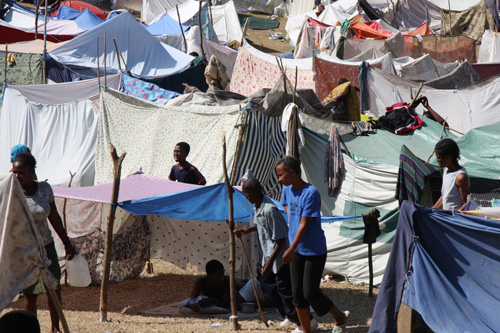Seeking shelter from the coming rain

Oxfam America’s Coco McCabe is one of several Boston-based colleagues in Haiti to help with the relief effort. Here’s her latest update, dated January 28.
After the roar of the day–the grinding, clanking, honking, chopping, and wailing of all the machines required for an emergency response—it’s a relief to slip into my tent, zip up the mosquito net, and listen to the night.
What do I hear? I’m not completely sure, since this is my first time in Haiti. I recognize the rooster, who winds up way before dawn. And though I can’t decipher the words, I understand the anguish in the voice of the man who shouts the same phrase over and over into the dark beyond our compound walls. Like many people here in Port-au-Prince, he’s stunned by the earthquake’s wreckage of life and property.
There are softer sounds too. A rustling in the low plants. The pat-pat of dried leaves falling on my tent roof. And is that rain?
I’ve been worrying about the rain since I got here, not because I’m concerned about getting soaked—my tent has a rain fly above it and a sturdy plastic tarp beneath it—but because of what I imagine will happen to the hordes of people now living in shelters made out of bed sheets or whatever scraps of plastic, cardboard, corrugated metal, or clothing they can find. Yesterday, I was in a hut with one wall made of ragged women’s dresses.
When the rain comes—and it will; the rainy season begins in April or May, with occasional downpours starting now—everyone who doesn’t at least have a tarp over their heads will get drenched. Already people are complaining about the cold at night. Add rain to the mix and you’ve got unabated misery.
So far, good shelter is in short supply. Oxfam has distributed some plastic tarps and more are on the way. We’re negotiating with an orphanage in Port-au-Prince that has the space to allow us to cut large pieces of plastic down to a household size. People can use the tarps in a variety of ways to meet their individual requirements—and our goal is to get those tarps into the hands of people before the wet season arrives. But still, the need here is enormous. The Haitian government has appealed for 200,000 tents.
In Muguet, a neighborhood high on a hill where destruction has given the place the feel of a moonscape, nearly 900 people have set up shelters on the only flat surface: a rock-strewn soccer field. When the rain comes, it will become a soupy mess.
At Delmas 75, a camp across the street from Our Lady of Perpetual Help (a Catholic church that’s now a jumble of concrete with only its sign intact), crisp white tents, tall enough to stand in, fill a section of an empty yard. “Shelter Box” says the name emblazoned across them. Some have plants set neatly under the fabric awnings and crushed stones to serve as paths to the zippered doors. Music, the clatter of dishes, children’s voices—the cacophony of an established neighborhood—swirls between these tents, which were provided by the mayor of Delmas.
But there weren’t enough to go around. Not nearly enough, not as newcomers straggle in and stake out a bit of turf at the back of the weed-tangled yard. One old woman works all afternoon in the relentless sun hacking holes in the ground with a machete, fastening a hodgepodge of posts together with bits of string, and finally draping some sheets across the structure. She smiles when her work is done, sweat heavy on her brow.
But what will she do if the rain comes before proper shelter arrives? What will countless families do?
Invest in Haiti’s recovery by donating to Oxfam’s Haiti Earthquake Response Fund.
Learn more about how Oxfam is responding.